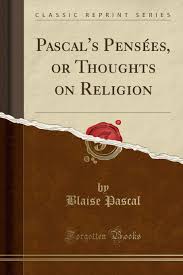Pensées Page #24
The Pensées is a collection of fragments on theology and philosophy written by 17th-century philosopher and mathematician Blaise Pascal. Pascal's religious conversion led him into a life of asceticism, and the Pensées was in many ways his life's work. The Pensées represented Pascal's defense of the Christian religion.
232 Infinite movement, the point which fills everything, the moment of rest; infinite without quantity, indivisible and infinite. 233 Infinite--nothing.--Our soul is cast into a body, where it finds number, time, dimension. Thereupon it reasons, and calls this nature, necessity, and can believe nothing else. Unity joined to infinity adds nothing to it, no more than one foot to an infinite measure. The finite is annihilated in the presence of the infinite, and becomes a pure nothing. So our spirit before God, so our justice before divine justice. There is not so great a disproportion between our justice and that of God, as between unity and infinity. The justice of God must be vast like His compassion. Now justice to the outcast is less vast, and ought less to offend our feelings than mercy towards the elect. We know that there is an infinite, and are ignorant of its nature. As we know it to be false that numbers are finite, it is therefore true that there is an infinity in number. But we do not know what it is. It is false that it is even, it is false that it is odd; for the addition of a unit can make no change in its nature. Yet it is a number, and every number is odd or even (this is certainly true of every finite number). So we may well know that there is a God without knowing what He is. Is there not one substantial truth, seeing there are so many things which are not the truth itself? We know then the existence and nature of the finite, because we also are finite and have extension. We know the existence of the infinite, and are ignorant of its nature, because it has extension like us, but not limits like us. But we know neither the existence nor the nature of God, because He has neither extension nor limits. But by faith we know His existence; in glory we shall know His nature. Now, I have already shown that we may well know the existence of a thing, without knowing its nature. Let us now speak according to natural lights. If there is a God, He is infinitely incomprehensible, since, having neither parts nor limits, He has no affinity to us. We are then incapable of knowing either what He is or if He is. This being so, who will dare to undertake the decision of the question? Not we, who have no affinity to Him. Who then will blame Christians for not being able to give a reason for their belief, since they profess a religion for which they cannot give a reason? They declare, in expounding it to the world, that it is a foolishness, stultitiam;[90] and then you complain that they do not prove it! If they proved it, they would not keep their word; it is in lacking proofs, that they are not lacking in sense. "Yes, but although this excuses those who offer it as such, and takes away from them the blame of putting it forward without reason, it does not excuse those who receive it." Let us then examine this point, and say, "God is, or He is not." But to which side shall we incline? Reason can decide nothing here. There is an infinite chaos which separated us. A game is being played at the extremity of this infinite distance where heads or tails will turn up. What will you wager? According to reason, you can do neither the one thing nor the other; according to reason, you can defend neither of the propositions. Do not then reprove for error those who have made a choice; for you know nothing about it. "No, but I blame them for having made, not this choice, but a choice; for again both he who chooses heads and he who chooses tails are equally at fault, they are both in the wrong. The true course is not to wager at all." Yes; but you must wager. It is not optional. You are embarked. Which will you choose then? Let us see. Since you must choose, let us see which interests you least. You have two things to lose, the true and the good; and two things to stake, your reason and your will, your knowledge and your happiness; and your nature has two things to shun, error and misery. Your reason is no more shocked in choosing one rather than the other, since you must of necessity choose. This is one point settled. But your happiness? Let us weigh the gain and the loss in wagering that God is. Let us estimate these two chances. If you gain, you gain all; if you lose, you lose nothing. Wager, then, without hesitation that He is.--"That is very fine. Yes, I must wager; but I may perhaps wager too much."--Let us see. Since there is an equal risk of gain and of loss, if you had only to gain two lives, instead of one, you might still wager. But if there were three lives to gain, you would have to play (since you are under the necessity of playing), and you would be imprudent, when you are forced to play, not to chance your life to gain three at a game where there is an equal risk of loss and gain. But there is an eternity of life and happiness. And this being so, if there were an infinity of chances, of which one only would be for you, you would still be right in wagering one to win two, and you would act stupidly, being obliged to play, by refusing to stake one life against three at a game in which out of an infinity of chances there is one for you, if there were an infinity of an infinitely happy life to gain. But there is here an infinity of an infinitely happy life to gain, a chance of gain against a finite number of chances of loss, and what you stake is finite. It is all divided; wherever the infinite is and there is not an infinity of chances of loss against that of gain, there is no time to hesitate, you must give all. And thus, when one is forced to play, he must renounce reason to preserve his life, rather than risk it for infinite gain, as likely to happen as the loss of nothingness. For it is no use to say it is uncertain if we will gain, and it is certain that we risk, and that the infinite distance between the certainty of what is staked and the uncertainty of what will be gained, equals the finite good which is certainly staked against the uncertain infinite. It is not so, as every player stakes a certainty to gain an uncertainty, and yet he stakes a finite certainty to gain a finite uncertainty, without transgressing against reason. There is not an infinite distance between the certainty staked and the uncertainty of the gain; that is untrue. In truth, there is an infinity between the certainty of gain and the certainty of loss. But the uncertainty of the gain is proportioned to the certainty of the stake according to the proportion of the chances of gain and loss. Hence it comes that, if there are as many risks on one side as on the other, the course is to play even; and then the certainty of the stake is equal to the uncertainty of the gain, so far is it from fact that there is an infinite distance between them. And so our proposition is of infinite force, when there is the finite to stake in a game where there are equal risks of gain and of loss, and the infinite to gain. This is demonstrable; and if men are capable of any truths, this is one.
Translation
Translate and read this book in other languages:
Select another language:
- - Select -
- 简体中文 (Chinese - Simplified)
- 繁體中文 (Chinese - Traditional)
- Español (Spanish)
- Esperanto (Esperanto)
- 日本語 (Japanese)
- Português (Portuguese)
- Deutsch (German)
- العربية (Arabic)
- Français (French)
- Русский (Russian)
- ಕನ್ನಡ (Kannada)
- 한국어 (Korean)
- עברית (Hebrew)
- Gaeilge (Irish)
- Українська (Ukrainian)
- اردو (Urdu)
- Magyar (Hungarian)
- मानक हिन्दी (Hindi)
- Indonesia (Indonesian)
- Italiano (Italian)
- தமிழ் (Tamil)
- Türkçe (Turkish)
- తెలుగు (Telugu)
- ภาษาไทย (Thai)
- Tiếng Việt (Vietnamese)
- Čeština (Czech)
- Polski (Polish)
- Bahasa Indonesia (Indonesian)
- Românește (Romanian)
- Nederlands (Dutch)
- Ελληνικά (Greek)
- Latinum (Latin)
- Svenska (Swedish)
- Dansk (Danish)
- Suomi (Finnish)
- فارسی (Persian)
- ייִדיש (Yiddish)
- հայերեն (Armenian)
- Norsk (Norwegian)
- English (English)
Citation
Use the citation below to add this book to your bibliography:
Style:MLAChicagoAPA
"Pensées Books." Literature.com. STANDS4 LLC, 2024. Web. 26 Nov. 2024. <https://www.literature.com/book/pens%C3%A9es_114>.




Discuss this Pensées book with the community:
Report Comment
We're doing our best to make sure our content is useful, accurate and safe.
If by any chance you spot an inappropriate comment while navigating through our website please use this form to let us know, and we'll take care of it shortly.
Attachment
You need to be logged in to favorite.
Log In